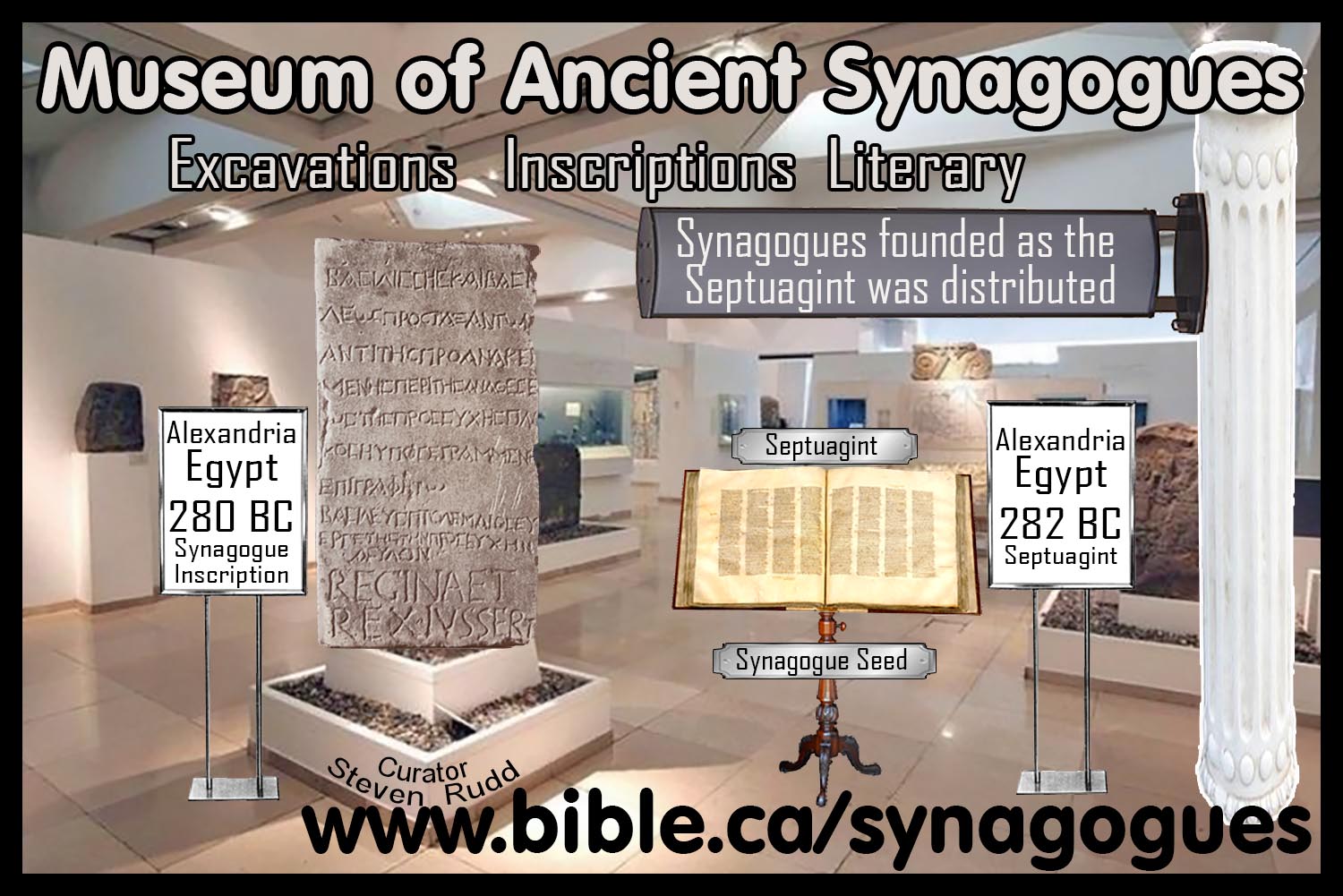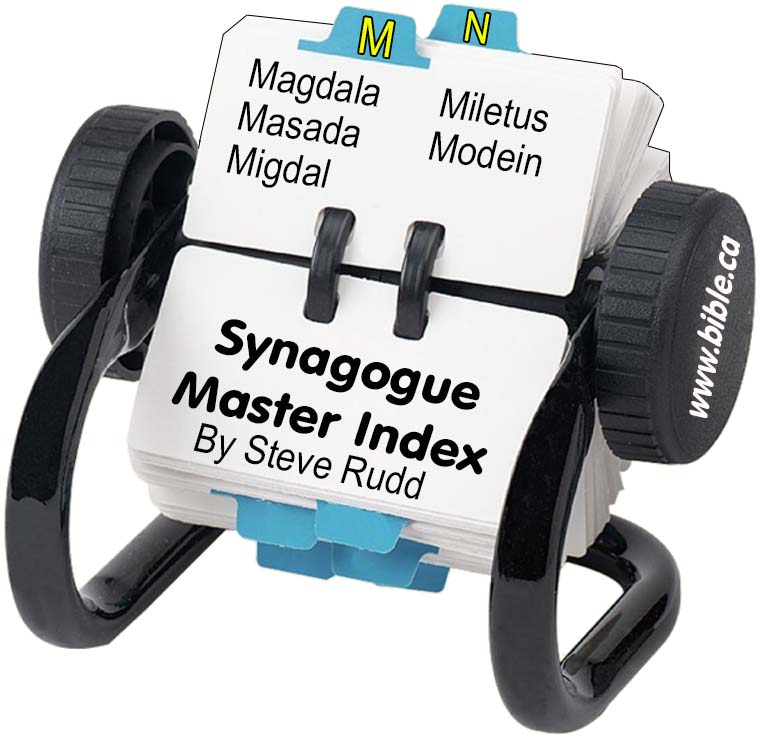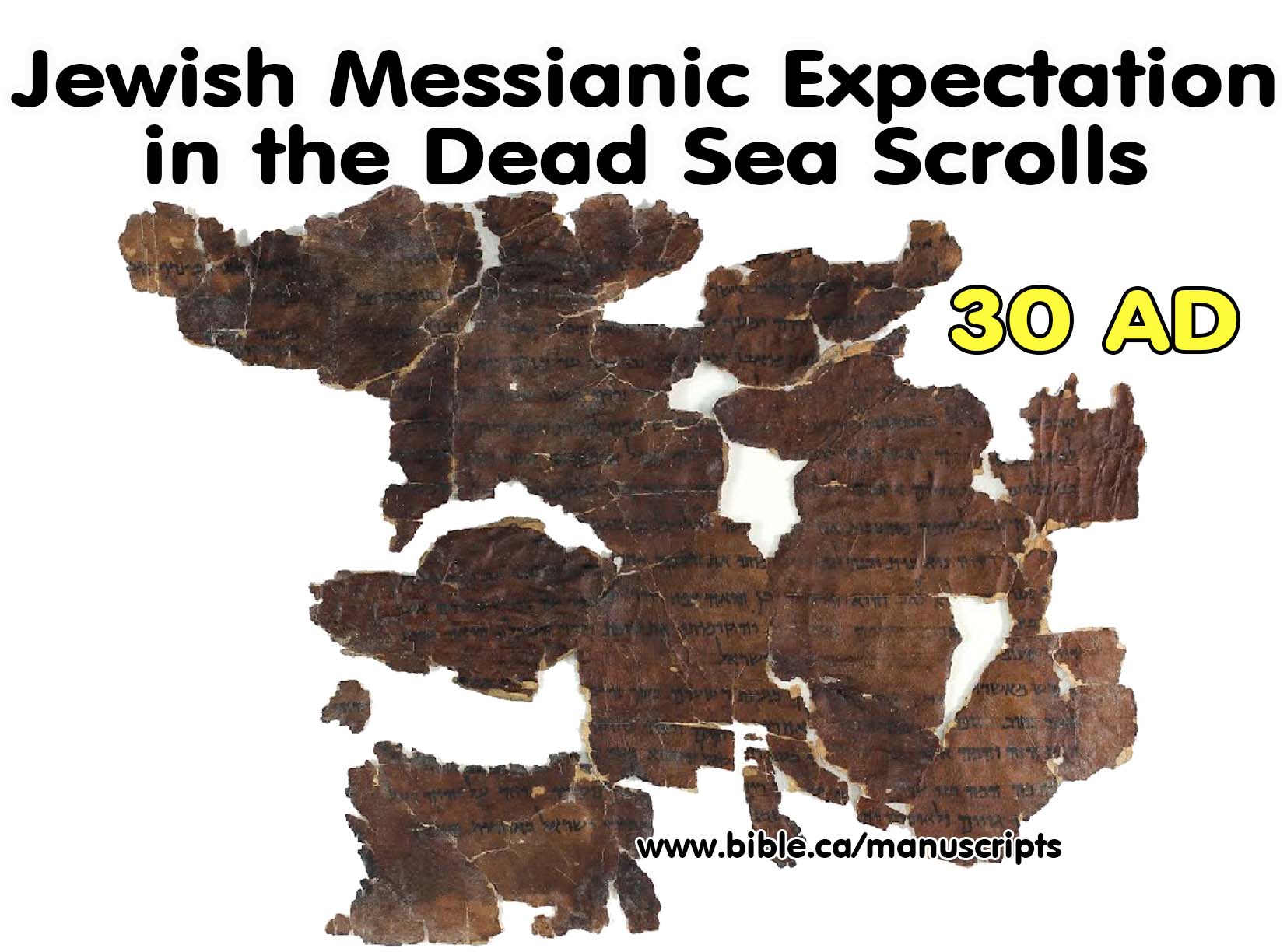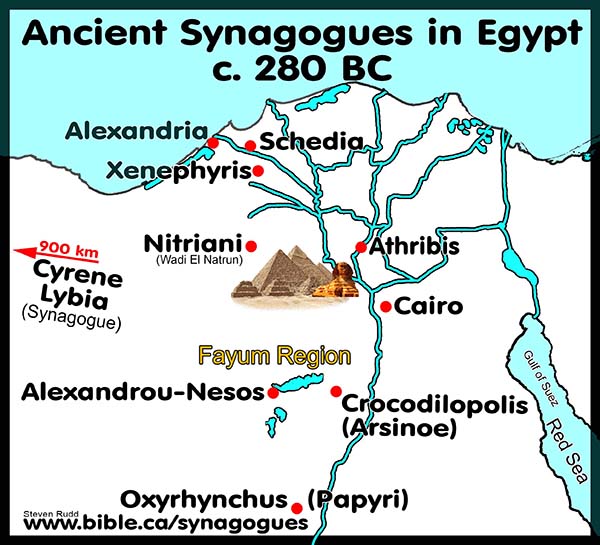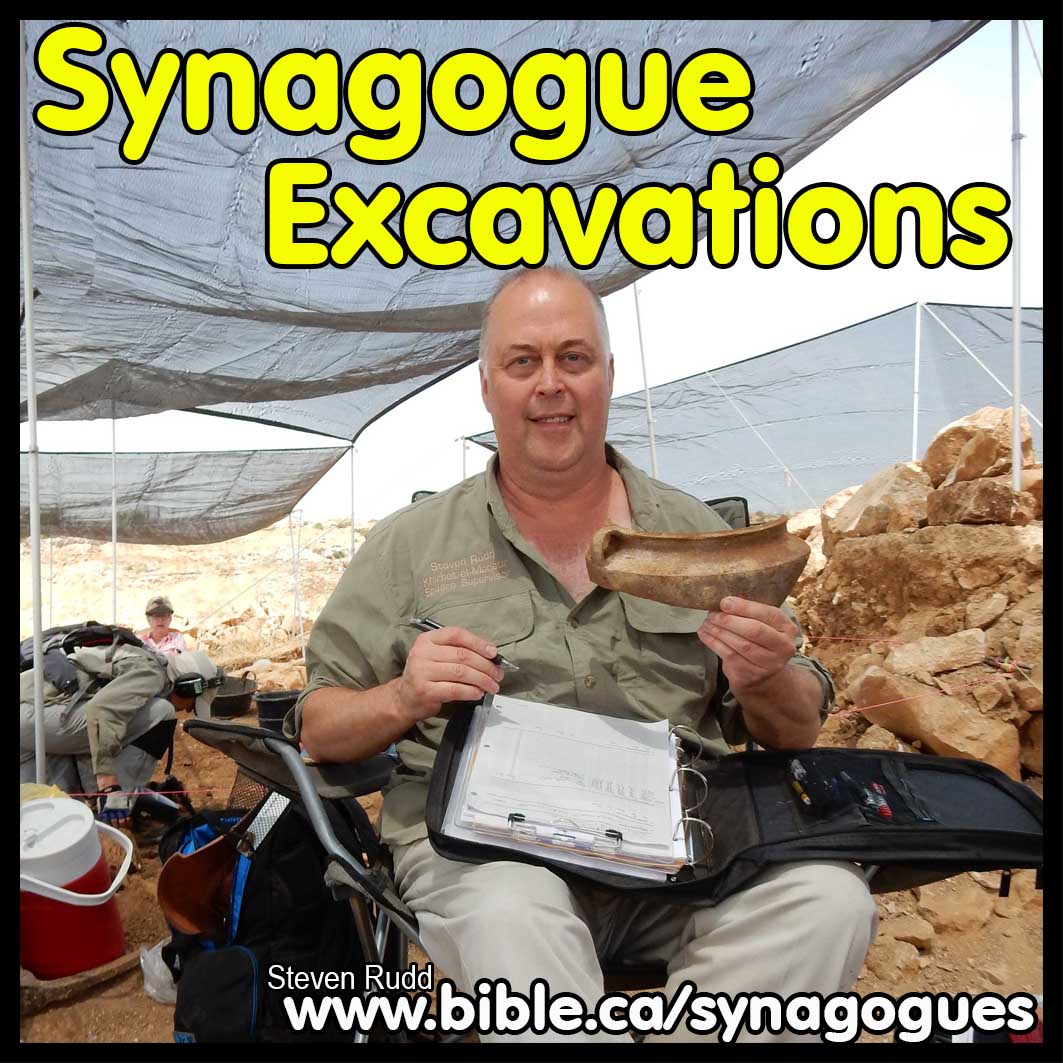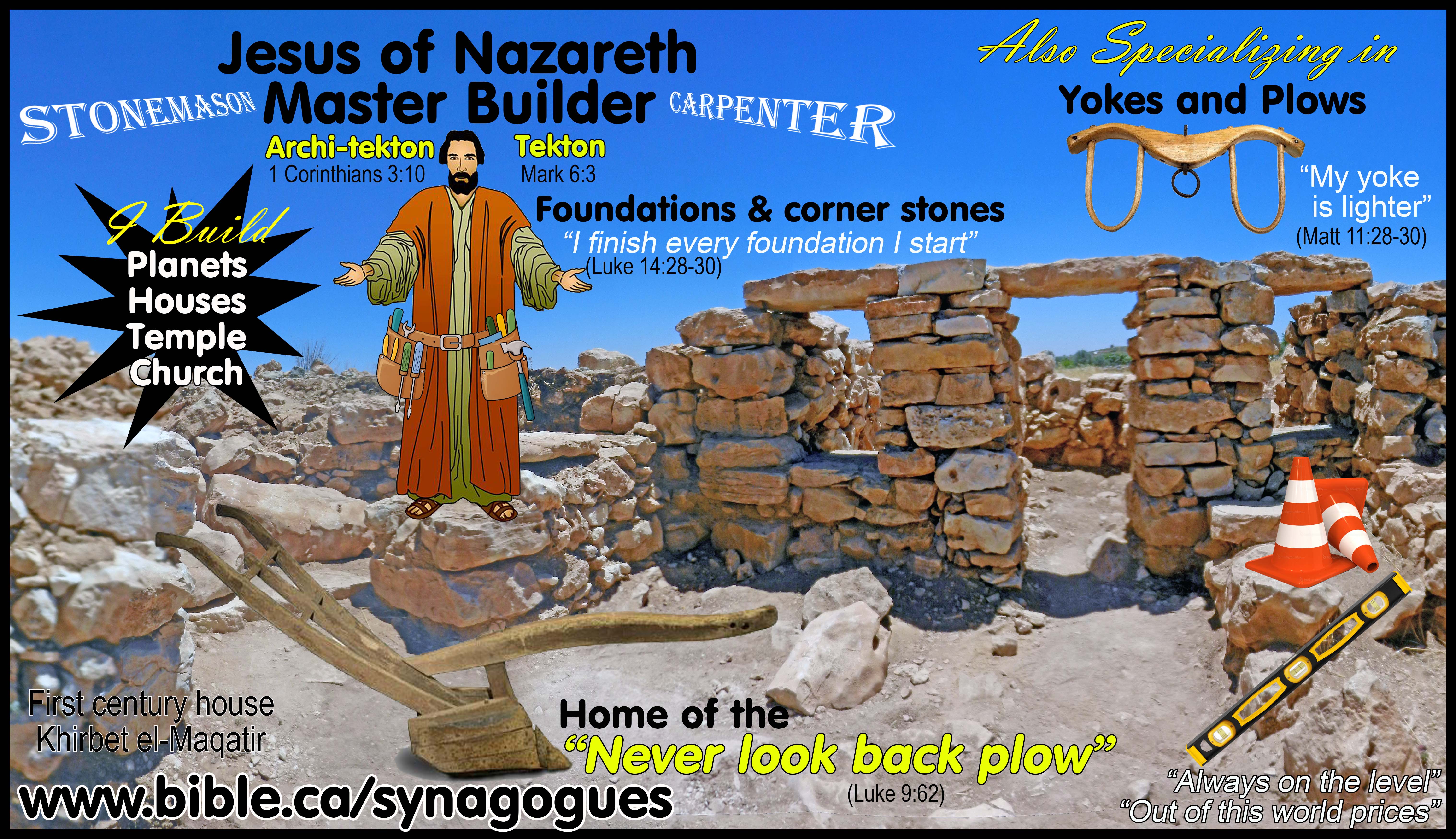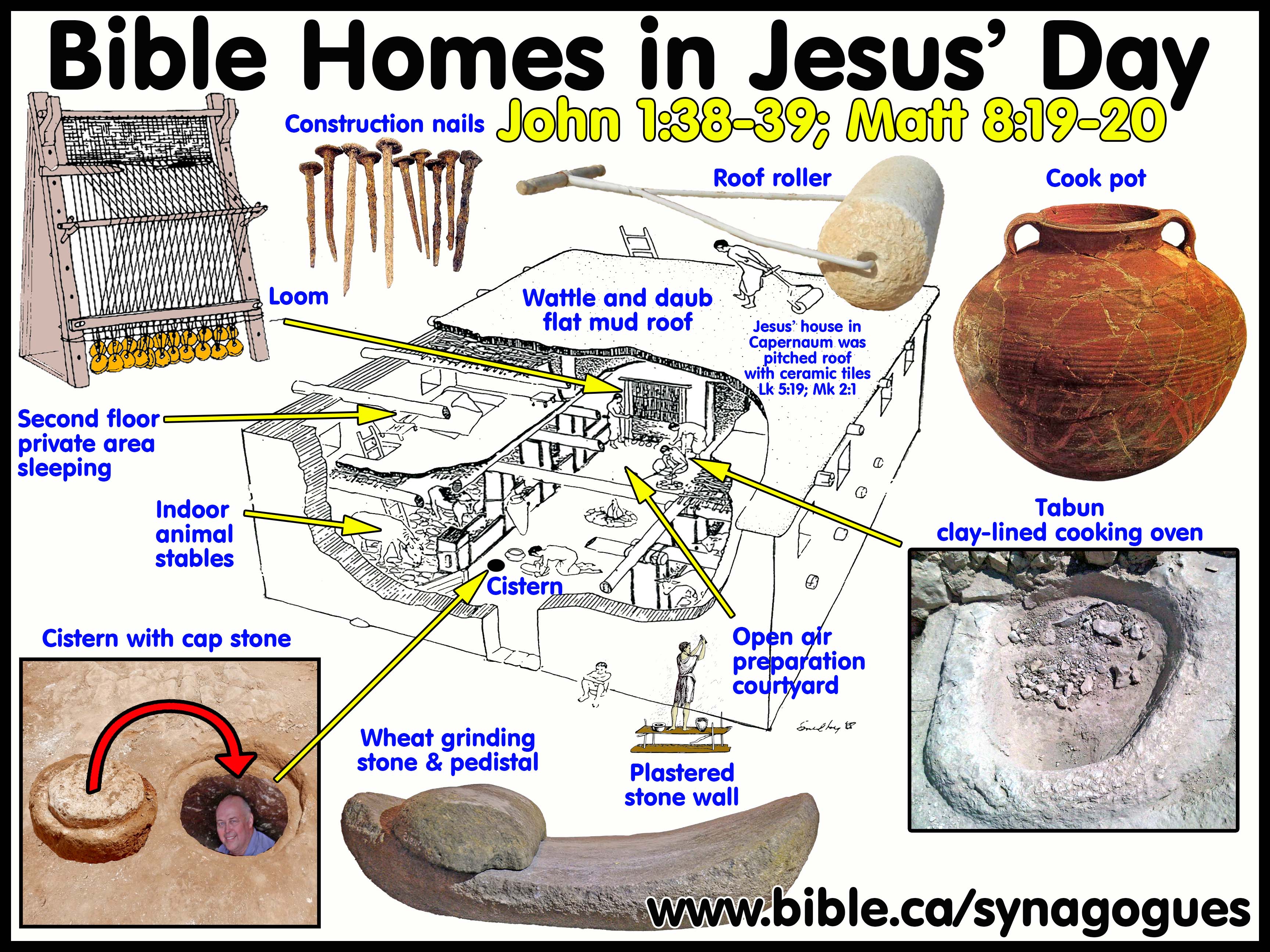|
Collective Names of Synagogues House of Prayer, Temple, Church First Century Synagogues and churches |
“On this Rock, I will build My church”
Ancient Synagogue Worship and the Church
Synagogue worship was the prototype for Christian Church.
|
COLLECTIVE NAMES OF SYNAGOGUES |
A. Collective names of the church
1. Technically the church has no name but is described in a collection of metaphors.
2. God never named the church, but collectively there are many metaphoric terms for God's People: Christians.
3. Is "MOON" the name of the moon? No!
a. Have you ever asked yourself "why did we name every planet in our solar system but not the moon?" We even named all the moons of Saturn, but we didn't name our own.
b. Why? Because you never need to name anything there is only one of!
c. Now, let's suppose you asked someone what the name of the moon is. What would they say? Obviously, they would say "MOON". Yet, that does not mean that the name of the moon is really MOON.
d. If you say to a child, while pointing to his father, "who is that man over there?" "Dadda" will most definitely be the reply. Now, it is obvious that "dadda" and "moon" are in the same category. There are many daddy's and moons but they are distinct in themselves. So the words "daddy" and "moon" are NOT names at all.
e. Same is true with the church. In the Bible, God describes his people in 40 + different ways, but none of them are a name.
|
Collective term/metaphor |
Meaning |
Verses |
|
Synagogue |
Gathering, collection, assembly |
James 2:2 |
|
Household |
Family: Love And Care |
1 Ti 3:15 |
|
Kingdom |
Authority: Privileges Obligations |
Col 1:13; Phil 3:20 |
|
Priesthood |
Service |
1 Pe 2:9; Heb 2:17 |
|
Temple Building |
God's Presence, Support & Dependency |
Eph 2:19-22; 1 Cor 3:11 |
|
Body |
Support & Dependency |
1 Cor 12:12-27; Rom 12:4-5; Col 1:18 |
|
Church of Christ/God |
Christ's Possession & Holiness |
Rom 16:16; Tit 2:14; Acts 20:28 |
|
Christians |
Christ's Possession & Household |
Acts 11:26; 1 Pe 4:16 |
|
Disciples |
Student Of Jesus |
Luke 14:27; Acts 11:26; Mt 28:18 |
|
Servants |
Selfless Obedience |
Luke 17:7-10 |
|
Flock |
Protection Of Caring For By Jesus |
1 Pe 5:2-4; 2:25 |
|
Army |
Fight Spiritual Battles For Jesus |
2 Ti 2:3-4; Eph 6:10-17 |
|
Wife, Bride |
Intimate Spiritual Relationship |
Eph 5:22-32; Rev 21 |
B. Synagogues and churches were called by the same five the Greek words:
|
English collective |
Greek |
Jewish assembly |
Christian assembly |
|
Synagogue |
Synagōgē |
Acts 15:21; Jerusalem Talmud Meg. 3:1 |
James 2:2 |
|
Prayer [house of] |
Proseuche |
Acts 16:13,16; Philo Embassy 156; |
Col 4:2 ; 1 Tim 2:1; 1 Peter 4:7 |
|
Church |
Ekklesia |
Philo Special Laws I.325 |
Rom 16:16; Tit 2:14; Acts 20:28 |
|
House |
Oikos |
3 Maccabees 4:17-18 |
1 Timothy 3:15 |
|
Sanctuary, Temple |
Heiron, Naos: church (different word same meaning) |
3 Maccabees 2:28 (Heiron) |
1 Cor 3:11; Eph 2:21 (Naos) Acts 2:46 first communion in Jerusalem Temple |
C. Synagogue “collective” names: “place of prayer” (Greek: proseuche)
1. Proseuche is the first meaning given to a synagogue that continued to 70 AD.
2. Used in the New Testament: “place of prayer” (proseuche)
a. Philippi Synagogue: "And on the Sabbath day we went outside the gate to a riverside, where we were supposing that there would be a place of prayer [proseuche]; and we sat down and began speaking to the women who had assembled." (Acts 16:13)
b. Philippi Synagogue: "It happened that as we were going to the place of prayer [proseuche], a slave-girl having a spirit of divination met us, who was bringing her masters much profit by fortune-telling." (Acts 16:16)
3.
240 BC: Schedia Synagogue: inscription

4. Philo: “Therefore, he knew that they had synagogues [proseuche], and that they were in the habit of visiting them, and most especially on the sacred sabbath days, when they publicly cultivate their national philosophy. He knew also that they were in the habit of contributing sacred sums of money from their first fruits and sending them to Jerusalem by the hands of those who were to conduct the sacrifices.” (Philo, Embassy 156, 20 AD)
5. Tiberius synagogue
a. Tiberius synagogue: “I also sent many persons all the way that led from Taricheae to Tiberias, that they might communicate, from one to another, if they learned any news from those that were left in the city. On the next day, therefore, they all came into the Proseuche; it was a large edifice, and capable of receiving a great number of people; thither Jonathan went in, and though he durst not openly speak of a revolt, yet did he say that their city stood in need of a better governor than it then had. (Josephus, Life 276-277)
b. Tiberius synagogue: “I also myself took my breastplate, and girded on my sword, so that it might be, as far as it was possible, concealed, and came into the Proseuche. Now Jesus, who was the ruler, commanded that they should exclude all that came with me, for he kept the door himself, and suffered none but his friends to go in. And while we were engaged in the duties of the day, and had betaken ourselves to our prayers” (Josephus, Life 293-295)
c. Tiberius synagogue: “When I was informed of these affairs, I determined to go to the city of Tiberias in the morning. Accordingly, on the next day, about the first hour of the day, I came from Taricheae, and found the multitude already assembled in the Proseucha; but on what account they were gotten together, those that were assembled did not know.” (Josephus, Life 280)
6. Ptolemais, Egypt: 75 BC: When arriving in Ptolemais [Egypt], named “Rose-bearing” on account of the particular character of the place, in which the fleet waited for them for seven days in accordance with their communal decision, 18 there they celebrated the deliverance with drinking, for the king supplied to them magnanimously all things for their departure to each person till the time when they should arrive at their own homes. 19 And when they had landed in peace, in like manner with appropriate thanksgivings, and there they also established these days to celebrate in good cheer for the time of their sojourning, 20 which events having also devoted to writing on a pillar and dedicating a place of prayer at the site of the banquet, they departed unharmed, free, and overjoyed, having been rescued by both land and sea and river by the command of the king [Ptolemy IV 222-204 BC], each to their 21 previous place. Possessing authority among their enemies, with honor and respect, they were extorted of their possessions by no one at all. 22 And they received back all their things in accordance with the registration, so that those possessing anything of theirs restored it to them with great tribute. The great God perfectly performed magnificent things for their deliverance.” (victory over Ptolemy IV Philopater 222-204 BC persecution; 3 Maccabees 7:17–22, 75 BC)
D. Synagogue “collective” names: “synagogue” (Greek: synagōgē)
1.
synagōgē in
Greek—means “gathering.” And that’s correct. Synagōgē
originally referred to simply a gathering of people. “Place of
gathering”(synagogue) partial first century and universal modern usage since
200 AD.

a. "For Moses from ancient generations has in every city those who preach him, since he is read in the synagogues [Synagōgē] every Sabbath.”" (Acts 15:21)
b. 394 Synagogues, courts and schools in Jerusalem at the time of Jesus: “Three judges of civil law were in Jerusalem, Admon, Hanan, and Nahum. Said R. Pappa, “Who is the Tannaite authority who repeats, ‘Nahum’? It is R. Nathan, in accord with that which has been taught on Tannaite authority: R. Nathan says, ‘Also Nahum the Mede was among those who make decrees in Jerusalem,’ but sages did not concur with him.” And were there no others? Didn’t R. Phineas say R. Oshayya said, “There were three hundred ninety-four courts in Jerusalem, corresponding to the number of synagogues [Synagōgē] and the number of schoolhouses and the number of schools for scribes”? There were many more, to be sure, but we make reference in particular to judges of civil law. Said R. Judah said R. Assi, “The civil judges who were in Jerusalem would collect their salary of ninety-nine maneh from Temple funds. If they didn’t find that suitable, they would add to the salary.” “If they didn’t find that suitable”? So are we dealing with money grubbers? Rather: “If they didn’t find that sufficient,” they would give them more, even though they didn’t want it.” (Babylonian Talmud, b. Ketub. 13:1, I.2.A–3.C)
2. In time, like the church, the Jewish “place of prayer” [Proseucha] shifted from meaning a “gathering of PEOPLE who pray”, to a specific “PHYSICAL STRUCTURE where people came to pray”.
a. This is analogous to the meaning of the word “church”—ekklēsia in Greek—really just means a gathering or assembly of people but in time came to refer to the physical church building to the exclusion of the people.
b. Never in the New Testament is the word “church” used of a “church building” or ANY physical building or meeting place.
3. In the New Testament “In church” or “Going to church” [ie. Going to the assembly] is a scriptural expression used explicitly by Apostle Paul:
a. "For, in the first place, when you come together as a church [Literally “in church”, ie. In assembly], I hear that divisions exist among you; and in part I believe it." (1 Corinthians 11:18)
b. "however, in the church I desire to speak five words with my mind so that I may instruct others also, rather than ten thousand words in a tongue." (1 Corinthians 14:19)
c. "If they desire to learn anything, let them ask their own husbands at home; for it is improper for a woman to speak in church [ie. in the assembly, not in the church building]." (1 Corinthians 14:35)
4. The church is a collective term that includes living and dead Christians and all Old Testament saints.
5. While it is true that the New Testament never uses the word “church” in reference to a physical building, it is used in a special collective sense of gathering together for communion on the first day of the week.
a. In other words, we are “in church Sunday morning at 11 AM”, but we ARE NOT “in church” when we are home or at work during the week.
b. It is therefore totally scriptural to say, “see you at church” or “I am going to the church” as long as you do not confuse these expressions for the physical church building.
E. Synagogue “collective” names: “church/called out” (Greek: ekklesia)
1. This is the same term used most often for the church.
2. Notice how Philo uses Ekklesia interchangeably with syllogos (Holy/Sacred assembly):
3. “Therefore, as it was aware that no inconsiderable number of wicked men are often mingled in these assemblies [ekklesia], and escape notice by reason of the crowds collected there, in order to prevent that from being the case in this instance, he previously excludes all who are unworthy from the sacred assembly [Syllogos], beginning in the first instance with those who are afflicted with the disease of effeminacy, men-women, who, having adulterated the coinage of nature, are willingly driven into the appearance and treatment of licentious women. He also banishes all those who have suffered any injury or mutilation in their most important members, and those who, seeking to preserve the flower of their beauty so that it may not speedily wither away, have altered the impression of their natural manly appearance into the resemblance of a woman.” (Philo, The Special Laws, I 325. 30 AD)
4. “And if any of them should be willing to forsake their old ways and to come over to the customs and constitutions of the Jews, they are not to be rejected and treated with hostility as the children of enemies, but to be received in such a manner that in the third generation they may be admitted into the assembly, and may have a share of the divine words read to them, being instructed in the will of God equally with the natives of the land, the descendants of God’s chosen people.” (Philo On the Virtues 108, 40 AD)
F. Synagogue “collective” names: “School” (Greek: didaskaleion)
1. The Jews considered every synagogue a school. In other word’s a synagogue was not merely a place for devotional prayers and reading, solid teaching took place there every Sabbath and additionally through the week.
2.
480 synagogues with schools in Jerusalem at the time of Jesus: “‘The
house of the Lord’ refers to the Temple. ‘And the king’s house’ refers to the
palace of Zedekiah. ‘And all the houses of Jerusalem’ refers to the 480 synagogues that were in Jerusalem. For R. Phineas
in the name of R. Hoshaiah: “There were 480 synagogues in Jerusalem and every
one of them had a schoolhouse [didaskaleion]and a house for learning, a
schoolhouse [didaskaleion] for Scripture and a house of learning for Mishnah.”
(Jerusalem Talmud, y. Meg. 3:1, II.2.D–E)
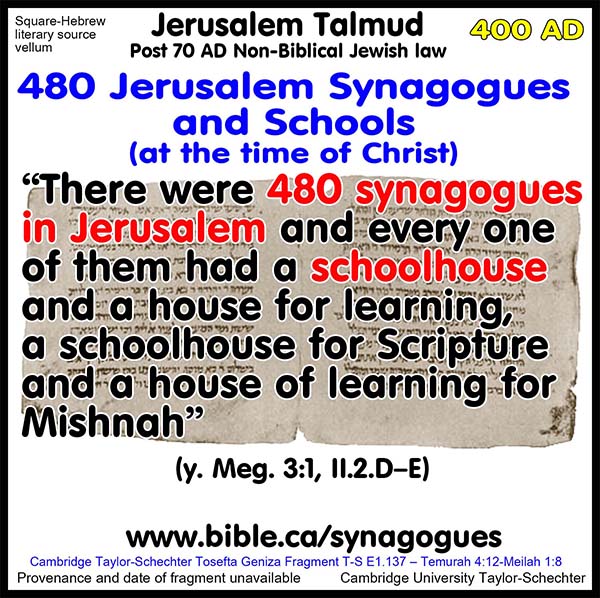
3. The same is true for the church. Every church is to be a school!
a. "All Scripture is inspired by God and profitable for teaching, for reproof, for correction, for training in righteousness; so that the man of God may be adequate, equipped for every good work." (2 Timothy 3:16–17)
b. "I solemnly charge you in the presence of God and of Christ Jesus, who is to judge the living and the dead, and by His appearing and His kingdom: preach the word; be ready in season and out of season; reprove, rebuke, exhort, with great patience and instruction. For the time will come when they will not endure sound doctrine; but wanting to have their ears tickled, they will accumulate for themselves teachers in accordance to their own desires, and will turn away their ears from the truth and will turn aside to myths. But you, be sober in all things, endure hardship, do the work of an evangelist, fulfill your ministry." (2 Timothy 4:1-5)
4. Following the New Testament example, the best Bible schools are churches, or at least they should be.
a. Almost every major university today is correctly described as secular, atheist, liberal and anti-Christian, yet these institutions were started as Bible schools by various churches.
b. Once a Bible school is endowed with self sustaining capital assets or government funding, it always becomes an enemy of Christ within a few decades.
c. There are no exceptions to this rule so best to spend your time teaching the way God intended in a school for anyone who wants to learn for free in the context of the best school on earth: the church.
5. The New Testament authorizes running Bible schools:
a. Bible, not secular courses are to be taught.
b. Science as it relates to refuting evolution can be taught.
c. Biblical Archeology, cartology and chronology must be taught.
d. Tuition is free because the school, as part of the church, is funded singularly from freewill donations from Christians every Lord’s Day.
G. Synagogue “collective” names: “Sanctuary, Temple” (Greek: heiron and semneion)
1. “for though Antiochus, who was calle d Epiphanes, laid Jerusalem waste and spoiled the temple, yet did those that succeeded him in the kingdom restore all the donations that were made of brass to the Jews of Antioch, and dedicated them to their synagogue [sanctuary: heiron]” (Josephus, Wars of the Jews 7.44)
2. Ptolemy IV Philopater’s (222-204 BC) decree refers to synagogues as temples. This may not be a normal use among the Jews: “Anyone who would not sacrifice in their temples [ie. Synagogues: heiron] shall enter, and all the Judeans shall be subjected to enrollment for poll tax and to servile status; and those who speak out against this are to be brought by force to be put to death“ (Ptolemy IV Philopater 222-204 BC; 3 Maccabees 2:28, 75 BC)
3. “The “Therapeutae” were a Jewish monastic order in Egypt of self denial and devotion to God that later Christians used as a pattern for Christian monastic orders: Philo describes them: “And this common holy place [Greek: semneion] to which they all come together on the seventh day is a twofold circuit” (Philo Contempl. Life 32)
H. Synagogue “collective” names: House and Place used interchangeably (Greek: oikos and topos)
1. "And after the aforementioned interval of time, the clerks insisted to the king [Ptolemy IV] that they were able no longer to carry out the registration of the Judeans on account of the immeasurable multitude of them. Although the majority were still in the country, some who had conspired were still in their houses [oikos], and others were even at that place [topos = synagogue], so that bringing the registration about was impossible for all the generals in Egypt." (victory over Ptolemy IV Philopater 222-204 BC persecution 3 Maccabees 4:17-18, 75 BC)
I. Synagogue “collective” names: “Sacred/holy assembly” (Greek: syllogos)
1. Notice how Philo uses Ekklesia interchangeably with syllogos:
2. “Therefore, as it was aware that no inconsiderable number of wicked men are often mingled in these assemblies [ekklesia], and escape notice by reason of the crowds collected there, in order to prevent that from being the case in this instance, he previously excludes all who are unworthy from the sacred assembly [Syllogos], beginning in the first instance with those who are afflicted with the disease of effeminacy, men-women, who, having adulterated the coinage of nature, are willingly driven into the appearance and treatment of licentious women. He also banishes all those who have suffered any injury or mutilation in their most important members, and those who, seeking to preserve the flower of their beauty so that it may not speedily wither away, have altered the impression of their natural manly appearance into the resemblance of a woman.” (Philo, The Special Laws, I 325. 30 AD)
J. Synagogue “collective” names: “Sabbath meeting place” (Greek: sabbateion)
1. “but if any be caught stealing their holy books, or their sacred money, whether it be out of the synagogue [Sabbath meeting place: sabbateion] or public school, he shall be deemed a sacrilegious person, and his goods shall be brought into the public treasury of the Romans.” (Josephus Antiquities 16.164)
K. Synagogue “collective” names: “Great Assembly” (Knesset)
1. 200 AD: “A bolt with a knob on its end— B R. Eleazar prohibits. C And R. Yose permits. D Said R. Eleazar, M’SH B: “In the synagogue/great assembly [Greek, knesset] in Tiberias they permitted [using it on the Sabbath], E “until Rabban Gamaliel and elders came and prohibited it for them.” F R. Yose says, “They treated it as prohibited. Rabban Gamaliel and the elders came and permitted it for them.” (Mishnah m. 'Erub. 10:10 A–F, 200 AD)
By Steve Rudd 2017: Contact the author for comments, input or corrections
|
Jesus your messiah is waiting for you to come home! |
|
|
Why not worship with a first century New Testament church near you, that has the same look and feel as the Jewish Synagogue in your own home town. As a Jew, you will find the transition as easy today as it was for the tens of thousands of your forefathers living in Jerusalem 2000 years ago when they believed in Jesus the Nazarene (the branch) as their messiah. It’s time to come home! |
|
By Steve Rudd: Contact the author for comments, input or corrections.
Go to: Main Ancient Synagogue Start Page


